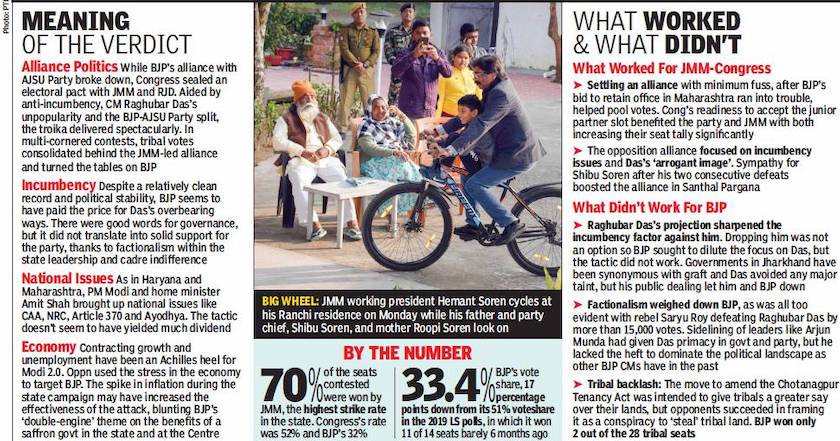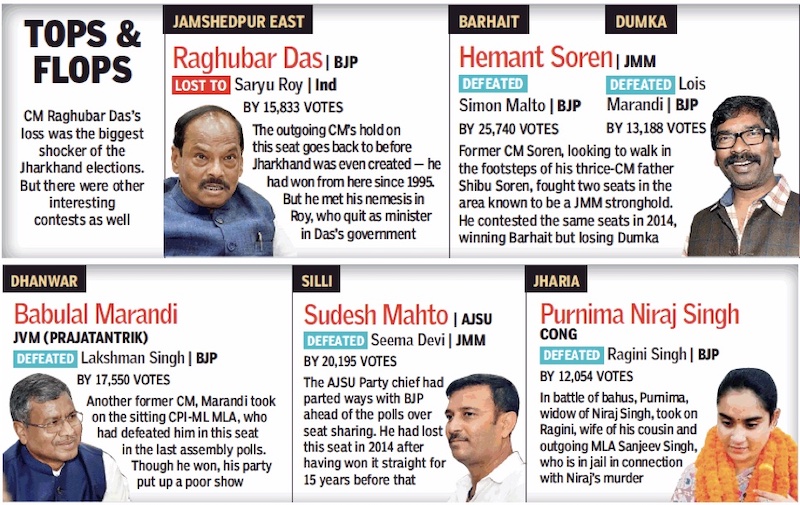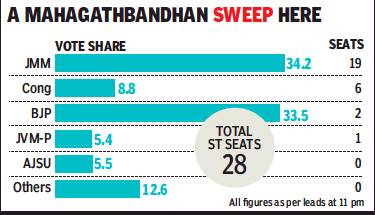Jharkhand: Assembly elections
(→The JMM and Congress win) |
(→Tribal seats: BJP wins 2 of 28) |
||
| Line 128: | Line 128: | ||
'' Tribal seats won by BJP, 2019 '' | '' Tribal seats won by BJP, 2019 '' | ||
| + | |||
| + | [[Category:India|J JHARKHAND: ASSEMBLY ELECTIONSJHARKHAND: ASSEMBLY ELECTIONS | ||
| + | JHARKHAND: ASSEMBLY ELECTIONS]] | ||
| + | [[Category:Jharkhand|J JHARKHAND: ASSEMBLY ELECTIONSJHARKHAND: ASSEMBLY ELECTIONS | ||
| + | JHARKHAND: ASSEMBLY ELECTIONS]] | ||
| + | [[Category:Pages with broken file links|JHARKHAND: ASSEMBLY ELECTIONS]] | ||
| + | [[Category:Politics|J JHARKHAND: ASSEMBLY ELECTIONSJHARKHAND: ASSEMBLY ELECTIONS | ||
| + | JHARKHAND: ASSEMBLY ELECTIONS]] | ||
==Split with AJSU cost BJP key votes== | ==Split with AJSU cost BJP key votes== | ||
Latest revision as of 19:47, 28 February 2022
This is a collection of articles archived for the excellence of their content. Additional information may please be sent as messages to the Facebook community, Indpaedia.com. All information used will be gratefully acknowledged in your name.
This is a collection of articles archived for the excellence of their content. |
Contents |
[edit] 2019
[edit] The JMM and Congress win
Dhritiman Ray & ASRP Mukesh, Dec 24, 2019 The Times of India

From: Dhritiman Ray & ASRP Mukesh, Dec 24, 2019 The Times of India

From: Dhritiman Ray & ASRP Mukesh, Dec 24, 2019 The The Times of India
The Jharkhand results delivered a morale-boosting victory to the opposition with the JMMCongress-RJD alliance winning a comfortable majority of 47 seats in a House of 81, and another state slipping out of BJP’s hands after its big sweep in the Lok Sabha elections that returned Prime Minister Narendra Modi to a second term.
Hemant Soren of JMM is set to take over as chief minister, returning to the job he held for a year before BJP won in 2015.
BJP slipped to 25 seats from 37 it held in 2014, its decision to contest alone after failed negotiations with regional ally AJSU Party backfiring and the party ceding the status of “single-largest party” for the first time. The contrast to the sweep in the LS elections — BJP won 11 and AJSU one of Jharkhand’s 14 seats — a little over six months ago was astonishing.
Till late in the evening, the JMM-led alliance had 47 out of 81 seats. While JMM had 30 seats, Congress had 16 and RJD one. JMM and Congress posted their best-ever shows. Soren, the working president of JMM, won from Dumka and Barhait seats in the tribal heartland of Santhal Pargana.
The saffron loss seems to be the fallout of several factors. The break with AJSU Party may have proved critical as the vote share of the two parties — BJP (33%) and AJSU (8%) — suggests that they could have made a fight of it if the alliance had held. Incumbency woes returned to haunt BJP with chief minister Raghubar Das losing his own Jamshedpur East seat to BJP rebel Saryu Roy by a margin of over 15,000 votes.
The nullification of Article 370, the Ayodhya verdict and the Citizenship (Amendment) Act could not give BJP an edge. Besides Das, BJP state president Laxman Gilua too lost his seat. If the CM suffered from an image problem, his upper hand in government and party also had a negative fallout. The sidelining of rivals led to a dependence on Das and though BJP did not totally lose the development narrative, the lack of a regional ally and the coalescing of tribal sentiment behind the JMM-led alliance proved too strong to overcome.
Tenancy act might have alienated tribal voters
Coming on the heels of the unexpected postpoll loss in Maharashtra, the Jharkhand result means that BJP is out of office in another important state.
After its Lok Sabha win, BJP has found the going tough in elections in states where it has been the incumbent, holding on to power in Haryana with the help of Dushyant Chautala’s JJP. In Maharashtra, BJP underperformed in terms of exit poll projections even though it won comfortably in alliance with the Shiv Sena only to face the desertion of its saffron twin.
The seeming alienation of the tribal vote, accentuated by the split with the OBC-driven AJSU Party, appears to be a fallout of the misfired attempt to amend the Chotanagpur Tenancy Act. While the intent was to give tribals greater say in disposal of their lands, it was read as an antitribal move. JMM and Congress shrewdly exploited this perception and turned a key voter segment towards them.
The Jharkhand result saw the opposition claim that BJP’s decision to raise “divisive” issues like CAA and a nationwide NRC has backfired. How such issues can play out in a national election cannot be easily determined, but in the immediate context, they failed to make up for incumbency and a ruptured alliance. BJP’s failure has provided an opportunity for Congress and other opposition parties to argue that there is a space for an anti-BJP narrative and smart alliances can work.
Congress functionaries said issues of jobs, food security, agrarian crisis, among others, worked with voters. Congress in-charge RPN Singh said, “The verdict is also a referendum against BJP’s CAA-NRC, Ram temple, Article 370 and 35A in Jammu & Kashmir versus jal, jungle, zameen in Jharkhand.”
For the opposition, the key was the smooth manner in which seat-sharing was arrived at with Congress willingly accepting the junior partner’s slot. After some bargaining, Congress also agreed on projecting Hemant Soren as the alliance’s CM face. The alliance that had done so poorly in the Lok Sabha elections — even JMM’s pater familias Shibu Soren lost — bounced back with surprising vigour, taking on BJP and its heavyweight campaigners, PM Narendra Modi and home minister Amit Shah.
While BJP’s use of “national issues”, articulated by Modi and Shah, has been questioned in the light of the results, there is a school of thought in the party that its numbers might have dipped even more if the party had gone local.
[edit] Highlights

From: Dec 24, 2019: The Times of India
See graphic:
The winners & losers, Jharkhand, assembly elections, 2019
[edit] The winners & losers
Dec 24, 2019 The Times of India
SONIA & RAHUL GANDHI
The acquiescence into “ junior player” status has brought returns which are only partly reflected in its best-ever score. The victory will help check the perception of decline and will motivate cadre.
That it has come off BJP makes it sweeter.
SHIBU SOREN
His loss in the LS polls had deepened Dishom Guru’s state of political irrelevance, a sharp come-down for Jharkhand’s three-time CM and bestknown tribal leader. BJP’s stinging loss at the hands of a JMM-led alliance will help restore his standing even if he does not wield executive power and remains restricted to being designated as patron
HEMANT SOREN
After his brief stint as CM in 2013-14, Shibu Soren’s son now has a chance to consolidate himself as a leader in his own right. BJP’s break-up with its tribal partner AJSU, the perceived resentment among tribals against Raghubar Das, the first non-tribal CM, and a deftly struck alliance with Congress and RJD has provided Hemant Soren a chance to complete a full term in office, a feat achieved so far only by BJP’s Das. Powered by the solid support of the Santhal community from which he hails, the JMM leader was able to polarise a significant section of tribal votes, also benefiting from incumbency against Das
LALU PRASAD
The RJD leader had fallen on hard days, his legal troubles compounded by political defeats and family squabbles. While his RJD would have done poorly on its own, it is a part of the winning alliance now. RJD will remain dependent on partners to be relevant in Jharkhand and Lalu’s cases will not go away. But he can now expect better treatment in the Ranchi jail where he is now lodged
‘MODI-SHAH'
As is their wont, prime minister Narendra Modi and BJP chief-cum-home minister Amit Shah went all out in the Jharkhand elections, raising national issues like the Ram temple at Ayodhya, CAA and the proposal for a nationwide NRC. The strategy did not pay off as CM Raghubar Das’s perceived unpopularity and the decision to fight the election on its own steam cost the BJP. It leads in vote share, but has lost its single-largest party tag for the first time in the state. A setback after the unexpected loss of Maharashtra. The duo now face the formidable challenge of unseating AAP in Delhi
BABULAL MARANDI
The former BJP leader and the state’s first CM, whose famous falling-out with his saffron colleagues has never healed, has again come up short. A self-made tribal leader who was once seen as an organic Santhal alternative to JMM and Shibu Soren, his refusal to be part of an alliance has hurt the JVM mascot, leaving him unable to translate goodwill for him into substantial results even as he won his own seat. With a JMM-led alliance firmly in the saddle, Marandi, now in his 60s, faces diminishing political options in the twilight of his career
SUDESH MAHTO
The boss of AJSU (All Jharkhand Students Union) held onto a goodly section of his vote, adding up to a shade over 8%, but his break with BJP deprived the saffron party of the possible support of Kurmis, sections of youth, and, to a lesser extent, other ‘backwards’, contributing to the opposition’s big win. Mahto decided to strike out on his own after a tussle with BJP over seat-sharing. This came just as BJP was embroiled in a bitter break-up with Shiv Sena. The parting of ways robbed BJP of a chance to return to office but reduced AJSU to a paltry 3 seats from which it will take a long time to recover.
[edit]

From: Dec 24, 2019: The Times of India
See graphic:
The ‘vote share’ in 2019 May, Dec
[edit] JMM vis-à-vis BJP: 2014> 2019

From: Dec 24, 2019 The Times of India
See graphic:
How the JMM defeated the BJP in 2019, vis-à-vis its loss in 2014
[edit] Tribal seats: BJP wins 2 of 28
See graphic:
Tribal seats won by BJP, 2019
[edit] Split with AJSU cost BJP key votes
Akhilesh Singh, Dec 24, 2019 The Times of India
Barely six months after BJP swept Lok Sabha polls in Jharkhand with a junior ally, winning 12 of 14 seats, the party failed to retain the momentum as its break with Sudesh Mahtoled All Jharkhand Students Union Party seems to have cost it dearly with voting percentages indicating an alliance might have staved off the opposition.
BJP’s loss is underlined by loss of its ‘single largest party’ tag for the first time, with Jharkhand Mukti Morcha winning more seats. The results could mark limits to the utility of ‘national issues’ in overcoming local incumbency and the promise of a ‘double-engine’ of growth — BJP governments at the Centre and state — failing to prevent disillusioned voters from switching loyalties.
The setback raises a question mark on BJP’s handling of negotiations with Mahto. While the regional party did pitch its demands disproportionately, BJP has been able to do business with a range of political parties, even Shiv Sena before its post-poll defection, in the past. Talks with AJSU Party broke down around the time BJP was grappling with Sena’s demands and the party brass saw Mahto’s move as intended to exploit a weakness.
The break left BJP bereft of a ‘local’ partner and Mahto’s appeal among OBCs remained a significant factor in the polls even though AJSU Party came a cropper. The close to 8% vote the regional party accrued could have made the difference between victory and defeat for BJP despite the complaints about CM Raghubar Das’s style of functioning. The lack of confidence about BJP’s prospects was evident in claims of party functionaries suggesting a reliance on post-poll alliances.
In first state polls in 2000, BJP (32) with allies won 40 seats and formed the government. The party again won 32 seats in 2005 and remained the single largest. However, it won 18 seats in 2009, equal to JMM. BJP won 37 seats in 2014 with AJSU as partner. Lacking AJSU Party’s vote bank, the OBC vote did not rally around BJP while tribal sentiment polarised towards the JMM-led alliance. BJP sources said Mahto’s original demand was in excess of 14 seats and the party was not ready to spare more than eight. Though BJP did not field a candidate against Mahto in Silli seat near Ranchi, the latter’s decision to contest in over two dozen seats dampened BJP’s chances even in constituencies dominated by Mahto (OBC) community.
Reports suggest that the Raghubar Das government was successful in reaching development schemes to people and adopted a tough posture against Naxals. But the benefits of the state not witnessing any major Maoist attack and the political stability did not deliver expected returns. The need to counter the downside of Das being a nontribal CM was not addressed.
